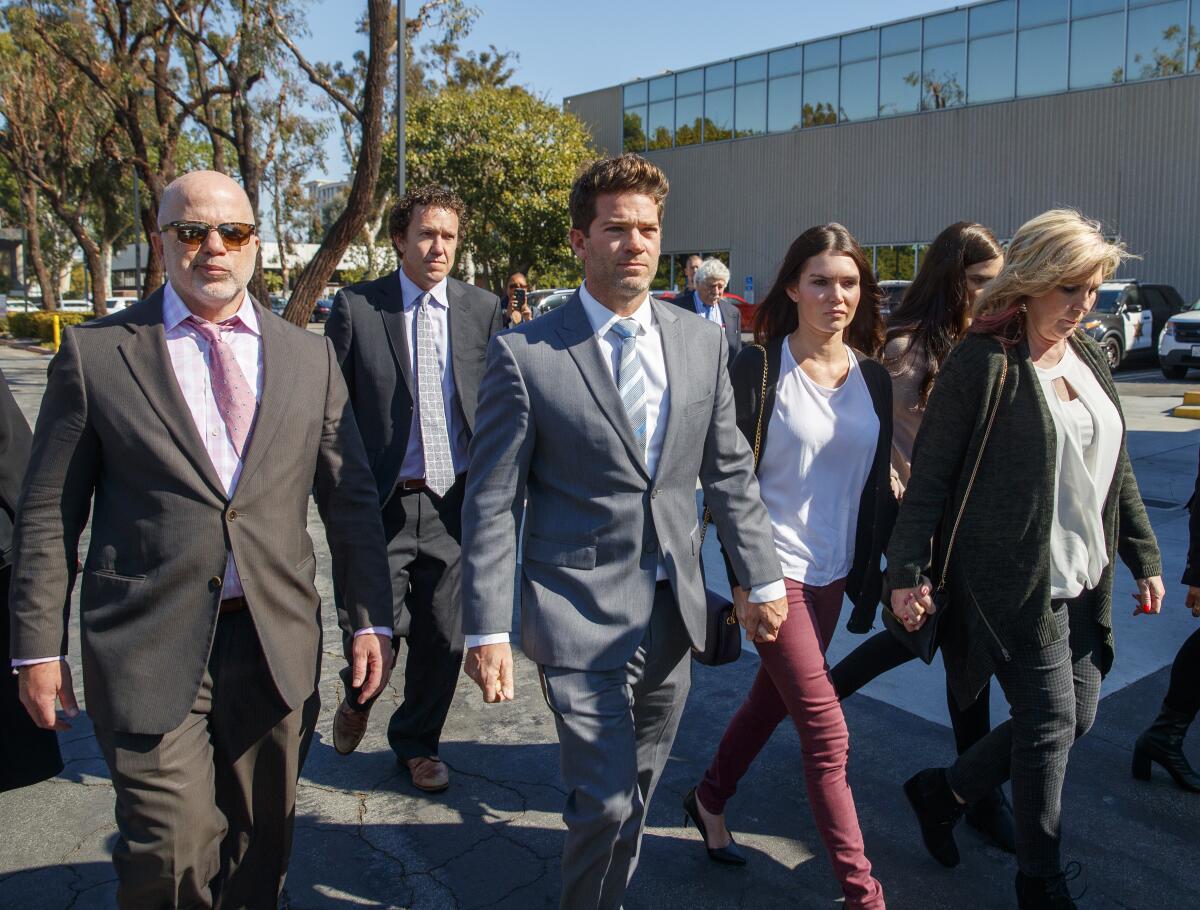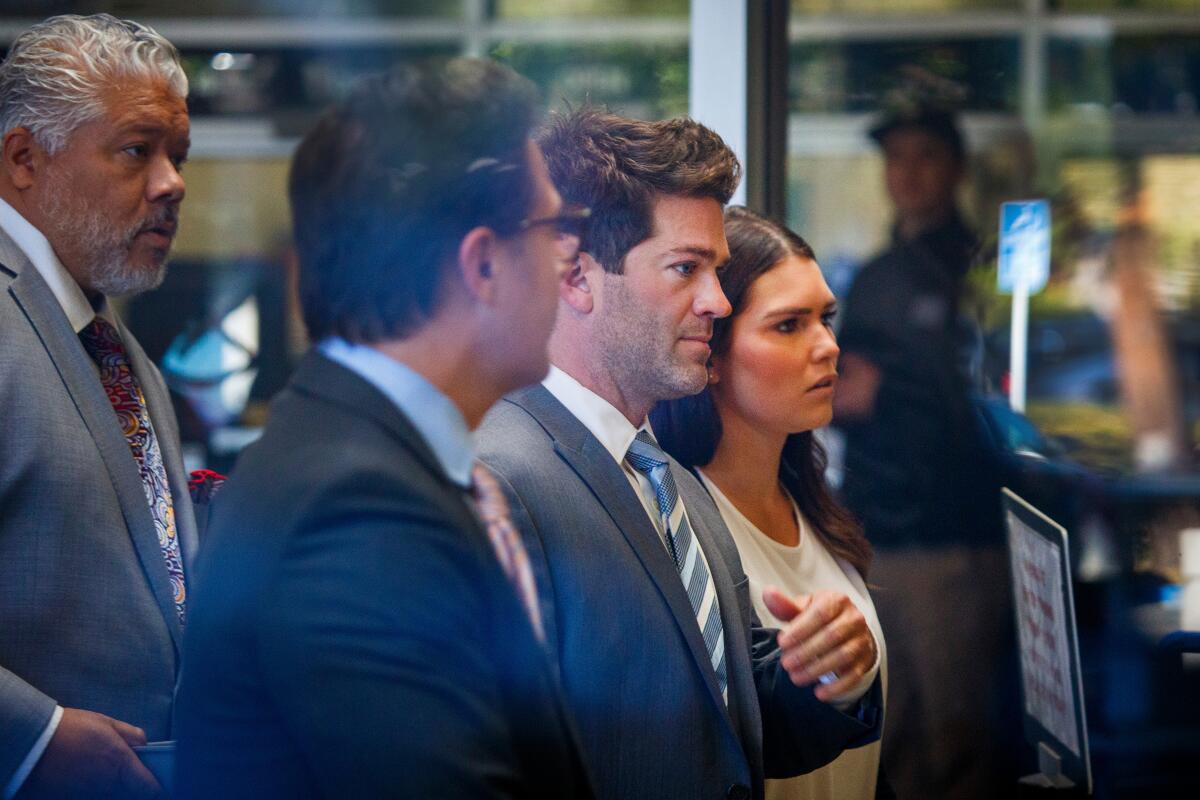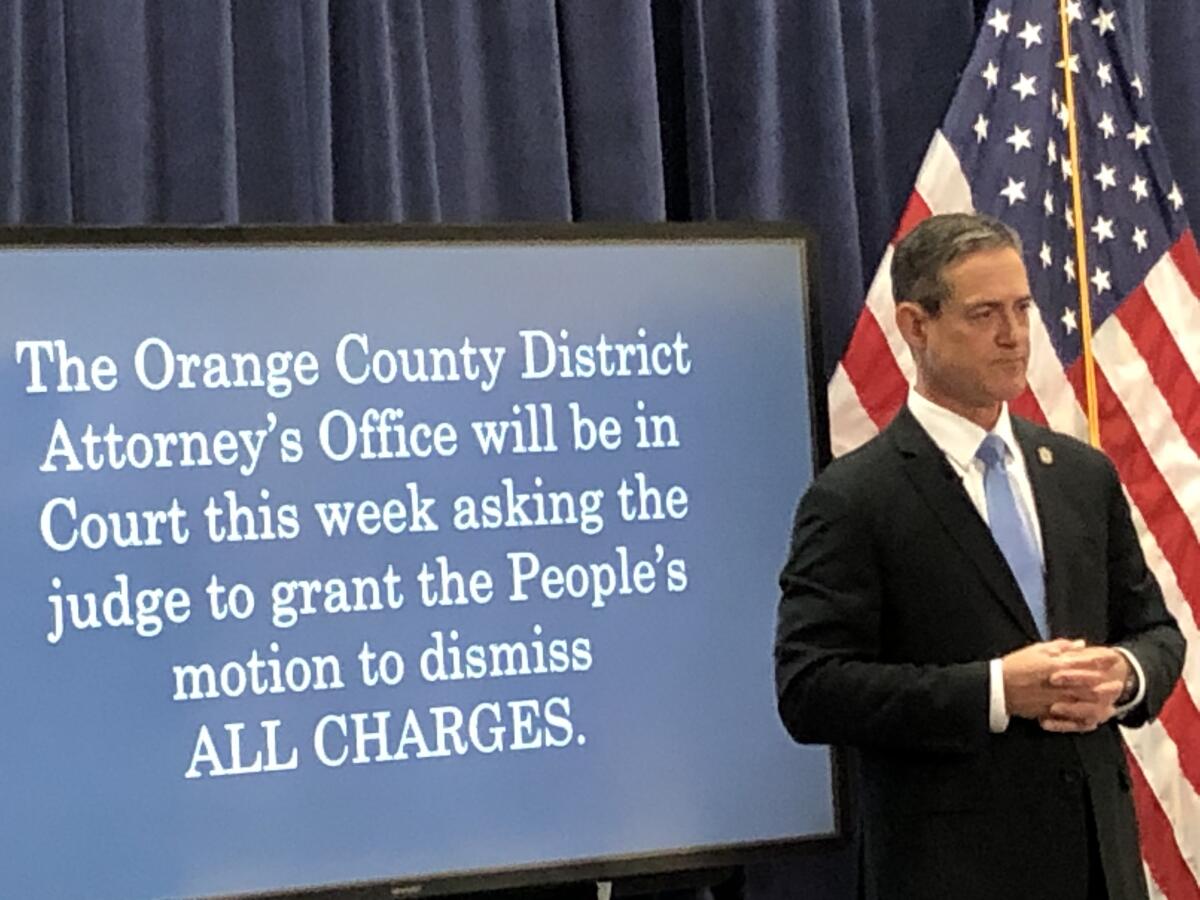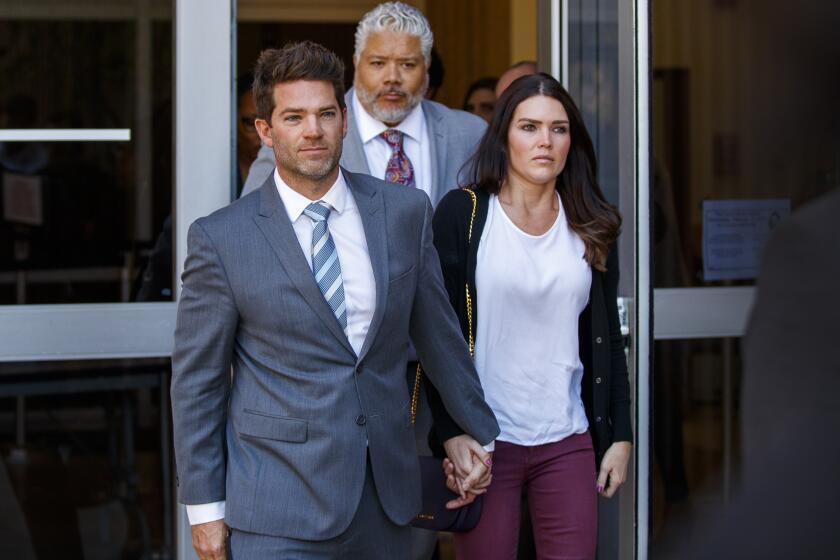Judge must weigh ‘furtherance of justice’ in ruling whether to dismiss charges in Newport surgeon’s rape case

- Share via
Prosecutors want to drop rape charges against a Newport Beach doctor and his girlfriend, saying they believe the evidence is insufficient. Defense lawyers naturally agree. And the accused steadfastly deny that they were a predatory “Bonnie and Clyde” who plied multiple women with incapacitating drugs and then recorded their assaults on them.
A judge will take awhile to think it over.
And, he says, the hard feelings of Orange County district attorneys past and present don’t interest him.
Dr. Grant Robicheaux, 39, is an orthopedic surgeon and a one-time reality TV personality who is facing 17 felony charges, including five counts of rape. His girlfriend, Cerissa Riley, 33, faces three counts of rape among 13 charges in connection with assaults that previous prosecutors alleged took place in Robicheaux’s Balboa Peninsula home. Both could face life in prison if convicted as charged.
District Attorney Todd Spitzer announced Tuesday that he would seek dismissal of all charges against Robicheaux and Riley related to allegations of assaults on seven women.
Whether their case makes it to trial rests in the hands of Orange County Superior Court Judge Gregory Jones.
In a hearing Friday that lasted more than two hours, Jones probed defense and prosecution lawyers about why he should dismiss the charges, which Spitzer said can’t be proved beyond a reasonable doubt.
Newport Beach surgeon Grant Robicheaux and his girlfriend, Cerissa Riley, charged with a series of sexual assaults, will have to wait two months before they learn whether their case will head to trial or be dismissed. An Orange County Superior Court judge said Friday that he will rule April 3.
Jones said he can only dismiss “in the furtherance of justice.” Though Spitzer and the defense have argued that former District Attorney Tony Rackauckas ginned up heavy and embellished pretrial publicity in 2018 fueled by his desire to be reelected, that cannot be a factor in the decision, the judge repeatedly told the lawyers.
“You’ve talked a lot about Mr. Rackauckas’ missteps, and I’m not going to get involved in that,” Jones told Spitzer early in the hearing. “I want to hear about why justice demands this case be dismissed. That means I want to hear about the evidence or lack thereof, not how Rackauckas poisoned the well.”
Jones is scheduled to return with a ruling April 3.
He directed both teams to prepare briefs to help him make his decision.
In addition to the criminal case, one of the seven accusers filed a civil suit. Dismissal would apply only to the criminal charges.
“It’s difficult in this case, because we have had politics mixing with prosecution at every stage of this proceeding,” Jones said. “Past district attorneys, current district attorneys — politics have infected this case, and mixing politics with prosecution gives you a toxic cocktail.”
Robicheaux and Riley, appearing in an interview that aired Friday on ABC’s “Good Morning America,” repeatedly denied the accusations of nonconsensual sex and said their lives have been in shambles because of them.
Riley said Spitzer’s move to drop the charges made her feel “like I finally woke up from a bad nightmare. I feel like I can breathe again.”
Robicheaux said the idea that he would commit the crimes he’s been accused of is hurtful. “I mean, I have sisters. I have a mom,” he said. “It’s disgusting.”

Robicheaux said his medical license was suspended and he had to leave his home because of threats.
“I feared every time I’d walk my dog that somebody was going to shoot or stab me, somebody was going to follow through with these threats on me or my family,” he said.
Defense attorney Philip Kent Cohen said earlier in the week that “the mere filing of this case has destroyed irreparably two lives. Destroyed.”
However, people backing the accusers said they shouldn’t be cast aside.
In a statement Tuesday, Rackauckas — who lost his reelection bid to Spitzer in November 2018 — defended his handling of the case and suggested the move to drop the charges was a “political vendetta against me.”
“My heart goes out to the women who had the courage to come forward with their complaint, because I believed their complaints based on the evidence I had before leaving office,” Rackauckas said. “I just hope they’re not being sold down the river for some twisted political motive.”
Michael Fell, who represents an accuser known as Jane Doe No. 4, read a statement in court Friday from the woman, who said she awoke drugged in Robicheaux’s home on an October morning in 2016.
“I know in my heart of hearts that I was sexually assaulted that night and I will never be the same,” she wrote.
She wrote that she felt she had been “failed by the system” when she heard about the move to dismiss the charges.
A victims’ rights advocate read a lengthy statement from Jane Doe No. 1, who said she didn’t report her assault allegations for nine years because she didn’t want to jeopardize her legal career, hurt her father or be doubted and judged.
She contacted the D.A.’s office after the initial charges were announced in September 2018.
Doe No. 1 wrote that she spoke to Spitzer the day of his news conference Tuesday — their first conversation — and that his mind seemed made up.
“I wanted to speak to the man who had determined without having ever met or spoken to me that I would not be believed,” she said through advocate Yarin Rosa. “Did he think the case could not be proven or had he made a unilateral decision that I had not been raped?”
Doe No. 1 said Spitzer told her he believed she was being truthful, but she thought that was to soften the blow of picking apart her account.
“He diminished my story in front of a room full of strangers with me on speakerphone and in effect told me that it was unclear whether I consented to sex,” she wrote.
She said there was nothing unclear about it.
“It’s not that we don’t believe her,” said Rick Zimmer, a veteran sexual assault prosecutor who Spitzer assigned to the Robicheaux case to help reevaluate the evidence.
“But,” Jones replied, “a jury might.”
Robicheaux and Riley sat in the gallery in the Harbor Justice Center courtroom in Newport Beach for the hearing, except for the accusers’ statements, when Robicheaux stepped out. He returned afterward.
The case became a sensation when Rackauckas announced that investigators had “thousands of videos” in evidence that showed there could be “hundreds” or “more than a thousand” victims.
Spitzer says those videos don’t exist —”not one” — citing an exhaustive three-month review by Zimmer and fellow sexual assault prosecutor Karyn Stokke of thousands of photos, videos, chats, texts and emails, hundreds of hours of interview recordings, thousands of pages of documents and inspection of social media and dating apps.
Jones, however, said Friday that “rape cases don’t generally involve people videoing what they are doing. We all know that.”
For their part, county lawyers argued last year on Rackauckas’ behalf that his estimate of a thousand or thousands referred to the number of videos, not the number of victims.

Zimmer said prosecutors have empathy for victims but also have legal, ethical and moral obligations to stand down if they believe the evidence is insufficient.
Cohen said evidence and motives can’t be kept apart.
“‘In furtherance of justice’ also encompasses due process and fairness, not just to alleged victims but also to defendants,” he said.
KTLA and the Los Angeles Times contributed to this report.
All the latest on Orange County from Orange County.
Get our free TimesOC newsletter.
You may occasionally receive promotional content from the Daily Pilot.





